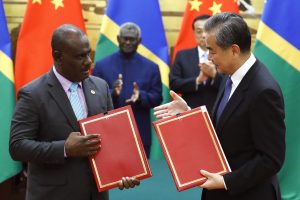On May 2, the 50 newly elected members of the Solomon Islands parliament voted Jerimiah Manele to be the nation’s new prime minister. Manele, who served as foreign minister under Prime Minister Manasseh Sogavare, was the man Sogavare nominated as the candidate for the leadership vote when he withdrew from the leadership contest. The election and ensuing prime minister selection process, keenly watched across the globe, are consequential on numerous levels.
Ahead of the May 2 vote, it appeared Sogavare and Manele’s party, the Ownership, Unity and Responsibility (OUR) Party, did not have the requisite numbers to win the prime ministership outright, given that they recorded a severe rebuke at the ballot box from the Solomon Islands people on April 17. The party won only 15 seats out of 50. However, as the elected MPs jostled over the high-stakes leadership vote, Manele managed to secure 31 votes.
The dissonance between the people’s electoral rebuke of the OUR Party and the installation of Manele as prime minister will be one significant point of ongoing friction. Voters can rightly say that their wishes were not translated into the leadership choice made by MPs.
The April 17 election was a showcase of a democratic processes operating well. The election was orderly and secure. But in the next step in the electoral process, the leadership vote, things became opaque. The shadow of financial inducements for votes will hang over this outcome, as happened before when Sogavare was accused of using funds donated by China to secure MPs’ support in a no-confidence vote following deadly riots in Honiara in late 2021. Regardless, Manele’s election is a reality that all must now contend with.
Manele has been a leading figure in Sogavare’s cabinet from 2019 to 2024, a period that saw drastic shifts within the nation and with its place in the world. Sogavare switched recognition from Taiwan to China in September 2019, prompting fierce responses throughout the country, particularly from citizens in the most populous province of Malaita, where relations with Taiwan were particularly strong. Since 2019, Manele has been a key architect in building the relationship with China, which caused world-wide alarm in March 2022 when it was revealed that Sogavare had signed a secret security deal with Beijing. This seismic geopolitical moment echoed throughout the Pacific as global eyes became trained on all Pacific Islands and their relationships with China, and ramped up concerns about the security landscape to levels not seen since World War II.
Sogavare’s geopolitical powerplays, which appear to have greatly enriched him, contrasted with a lack of attention to the dire needs of his constituents that again resulted in violent riots in Honiara and building anger toward the government. That discontent was voiced in the April 17 election. Sogavare’s political future is bolstered by Manele’s prime ministership, and given the workings of parliamentary democracies, it is not out of the question that Sogavare might make a power play to oust Manele as leader down the road.
Now that Manele is confirmed to succeed Sogavare as prime minister, it can be confidently said that there will be continuity in the Solomon Islands’ relationship with China. Whatever window of opportunity the election presented for a change of course on the geopolitical front has closed. Global concern about the regional security issues stemming from China’s substantial inroads in the Solomon Islands will continue.
Manele, however, cuts a different figure than his predecessor and endorser. While Manele has been instrumental in fashioning the Solomon Islands’ substantially upgraded and integrated relationship with China, he also has considerable experience working with Beijing’s “opposition,” namely Australia, Japan, and the United States.
Before becoming the elected representative for the Hograno/Kia/Havulei electorate on the island of Isabel in 2014, Manele was a leading bureaucrat and career diplomat. He led several government departments and was then appointed counsellor and later charge d’affaires of the Solomon Islands Permanent Mission to the United Nations in New York. He is therefore well-known and is considered a much more affable representative of his nation than Sogavare.
Sogavare took a hostile approach to many nations other than China and rebuffed numerous overtures for development assistance that would have greatly benefitted his people. In contrast, the hope with Manele is that the hurdles to engagement in the Solomon Islands put up by Sogavare will be diminished. According to Honiara-based journalist Dorothy Wickham, Manele “will have a more balanced view and use better language towards our donors.”
Forging better relations with all donor nations will be imperative for Manele if he is to address the root causes of national discontent and not allow his nation’s future to be bargained away with closer relations with China. In his first public statements since being installed as prime minister, Manele put the interests of his nation at the forefront. Georgina Kekea reported that Manele “reiterated his commitment to serving the interests of the people and the nation with honesty and dedication. He emphasized the importance of cooperation and collaboration in addressing the challenges facing the Solomon Islands and seizing opportunities for growth.”
Manele also needs to play a leading role in deflating regional security tensions that are running too hot. He now has a pivotal role to play in brokering better relations that can secure a peaceful and more prosperous region. While Manele has many challenges ahead, keeping the interests of his people, of which peace is paramount, at the forefront of his government’s work will serve all parties, including China, well.

































